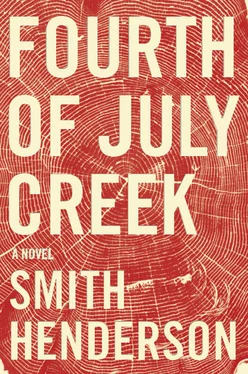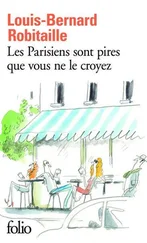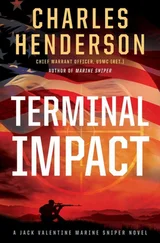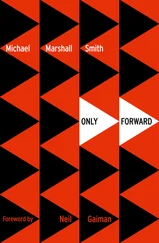Pete felt a cold churning in his bowels and his testes, and he moved some feet away. He guessed there was no remedy, and then thought maybe he should gather the pieces of bone and brains, but he knew he was just torturing himself.
He steeled himself to sit next to this person he’d known as a boy, went to him. He took his hand and told him it was all right to go on and that he was sorry and asked him why he had been such a stupid son of a bitch, was it worth it, of course it wasn’t.
This was September. Autumn was gathering itself up and the feeling all around was of happy things departing.
Sometime later it occurred to Pete that Wes could perhaps be dying for days. He thought of President Lincoln, breathing unbidden a whole night, and much older than Wes when he’d been shot. He thought about Benjamin becoming a murderer. A boy that age.
When it had gotten dark, the man choked but would not die. Suffocating but not yet dead. It was unbearable to hear, and finally Pete palmed the dying man’s nose and mouth, thinking, I’ll bear some of this, some of this is my fault, maybe the better part of it. But when the man’s breathing ceased, nothing stirred in the woods, and Pete was even more profoundly alone. That was unbearable too. But there was nothing to do about it.
He left the man’s body in the night. He worried someone would see the judge’s car at the trailhead. In the dark he trod the old Deerwater road where wagons would haul ice, ice cream, lamp oil, and prostitutes. He mused idly on whether Wes was the last murder in this town or were there a few more unlikely deaths yet making their way here.
A pale fingertip moon eased up over the tree line. A spotlight. A night for bandits.
In the morning, he waited for Neil to open the Ten High. Neil sipped coffee watching Pete drink beers.
“You want anything to eat?”
“No thanks.”
“What the hell’s the matter with you?”
“That question’s bigger than I can properly answer right now.”
Neil watched Pete’s hands run along the bar like he was admiring the tail fin of an old Chevy.
“Mind I put the TV on?”
“No.”
“Will you stop that?”
Pete put his hands around his beer. Neil shook his head and turned on the television with a pool cue cut down for the purpose and watched the morning news with one foot high on the cooler and the other on the duckboards. From time to time he glanced at Pete.
The judge waddled in shy of noon, waited for his eyes to adjust to the gloom, and then went straight for Pete.
“The police are looking for you.”
“That was quick.”
“What happened?” the judge asked. “Fuck off, Neil.”
Neil shot the judge a wounded look and then went out from behind the bar, got a broom from the closet, and went out front to sweep.
“They came to my house, Pete. Everybody knows that car is mine.”
“Who found him?”
“Couple kids cutting class.” He waited for Pete to say something. “What the hell happened?”
“He’s the one burned down my house.”
“Jesus Christ. Where’d Neil go? I want a drink.”
The judge went behind the bar, poured himself a rye and then another one.
“You got cause now. Heat-of-the-moment kind of deal. A jury would—”
“I didn’t kill him. I was there, but I didn’t kill him.”
“Luke?”
“No.”
“Who then?”
Pete leaned over the bar and filled his beer from the tap, sipped off the foam.
“I need you to find someone for me.”
Pete had a few more big swallows of beer. Burped. The judge took it from his hand and set it aside.
“The cops are going to talk to you any minute. Don’t say shit. I already called Jim Uhlen. You’ll probably want to get somebody better, this goes to trial. But he’s already on his way from Kalispell.”
Pete grinned somberly.
“You’re welcome, Pete.”
“I don’t need a lawyer.”
“Yeah. You fuckin do.”
“There’s this ATF agent I need you to find for me. Name of Pinkerton. He’s the one I need to see.”
Trucks and vans full of armed federal agents, marshals, and officers commandeered Pearl’s house and set a pair of snipers on the cliff. They ran dogs. The once-impregnable mountain meadow was taken without a shot fired in defense of it.
Pete rode in a helicopter, pointing out as best he could the places where they’d camped, but the Yaak was virtually impenetrable from the air. He showed Pinkerton where he’d cached food and clothes for the Pearls, and tried to discern on their topo maps all the places he’d been with them. He’d covered a lot of ground with them, and Pete was sure he hadn’t seen the half of it. They traipsed the Purcells, Whitefish, Salish, and Cabinet mountain ranges. They slipped into Glacier Park, maybe Canada. When he’d first met them, they’d been having a rough go of it, and the wilderness was winning, but with a little help from Pete they’d gotten healthier. He assured the feds that they had provisions, first aid, medicines, plenty of bullets, and in the thick forests and untracked roadless areas of the Yaak in particular, they were virtually invisible.
Nights he sat on the porch of the house, half-wishing Pearl would shoot him from somewhere in the trees. Agents inside smoking, talking about their kids, about professional football, the Soviet Union. Worlds and worlds away from here.
He felt an odd but true yearning to apologize to someone. For what was happening. What all he’d done wrong.
His life.
The wardens from Fish, Wildlife, and Parks had jurisdiction but handed it over to the FBI and ATF. The Tenmile police interviewed Pete, but mostly, it seemed, to satisfy a morbid curiosity. Even a brief meeting with his lawyer only amounted to Pete again sharing his story and the man sharing his business card. As far as everyone was concerned, Wes had followed Pete up to Deerwater and touched off a confrontation with a mountain lunatic who’d begun to trust Pete and reacted violently to the appearance of an armed agent of the state. And except for the fact that it was the boy who’d fired the shots, all of what Pete said was true.
But the Department of Corrections was still institutionally convinced that Pete was hiding his brother, and one windy day the judge and a man from Corrections sat down at Pete’s table in the Sunrise Cafe. The winter cold had come early and fierce — no snow, just an unceasing front of arctic air — and when the judge opened the cafe door people jumped at the cold as though he’d laid on a car horn. A family decamped with their French dips and grilled cheeses for warmer reaches near the kitchen.
The man from Corrections introduced himself, but Pete was far gone within his thoughts and immediately lost the man’s name. He said that although it was generally believed that Pete was telling the truth about who had killed their colleague, it was hard to ignore Officer Reynolds’s own documented opinions on the matter of Luke Snow’s whereabouts.
“I won’t speak ill of the dead,” Pete said.
“I’m not asking you to. But you should tell me where your brother is. Wes was certain that you know.”
Pete had Luke’s address in his wallet when he said he hadn’t the slightest idea where his brother was. The man from Corrections put his cowboy hat back on, slid out of the booth, and walked out the door. The judge remained, didn’t even bid the man good-bye, and quietly stirred his coffee.
“You hell-bent on going to jail too?”
Pete looked through the fractals of frost on the big front window and out on the deserted square.
“Everyone goes to all this trouble to find a degenerate like Luke or track down some madman in the woods,” Pete said, “but no one can tell me where Rachel is.”
Читать дальше












